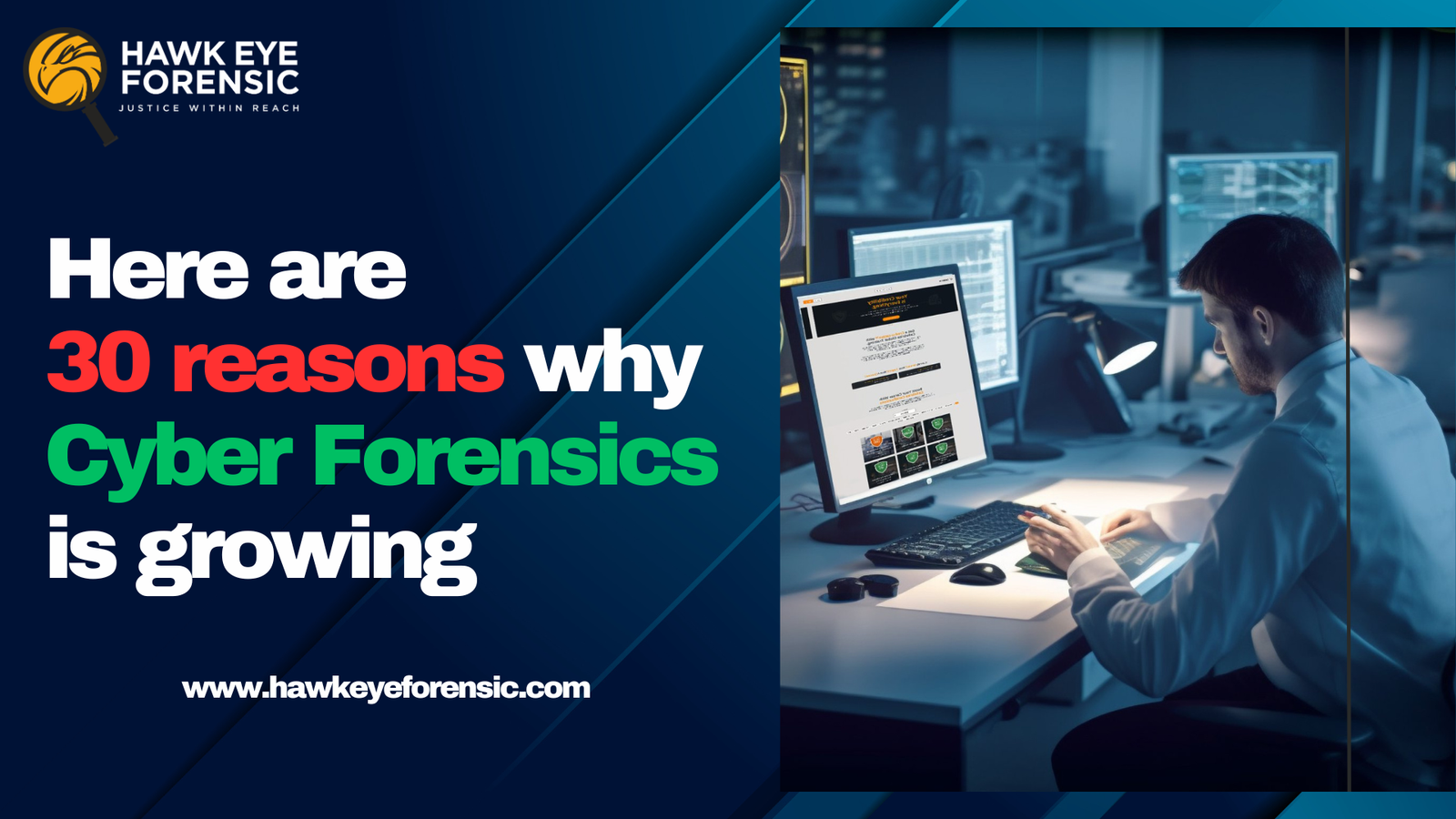
THE DARK SIDE OF SOCIAL MEDIA
Social media has undoubtedly transformed the way we communicate, connect, and share our lives with others. However, these platforms have also become breeding grounds for a variety of unethical activities ...


Digital Forensics Jay Ravtole todayMay 6, 2024


Cyber forensics is a rapidly expanding field that plays a crucial role in the investigation of digital crimes and security breaches. Here are many reasons that contribute to its growth
Increasing Cybercrime Rates: As more activities move online, cybercriminals have expanded their activities, leading to a surge in cybercrimes.
The sophistication of Cyber Attacks: Cybercriminals are employing advanced techniques, necessitating the need for equally sophisticated cyber forensic tools and techniques to investigate and mitigate these attacks.
Digital Transformation: The digitalization of businesses and organizations has increased the volume of digital data, creating more opportunities for cybercriminal activities and thereby driving the demand for cyber forensics.
Regulatory Compliance: Stricter regulations require organizations to invest in cyber forensics to ensure compliance and mitigate legal risks associated with data breaches.
Rising Cybersecurity Concerns: High-profile data breaches and cyber attacks have raised awareness about cybersecurity risks, prompting organizations to prioritize cyber forensics to strengthen their security posture.
Cloud Adoption: The widespread adoption of cloud computing has led to new challenges in securing digital assets stored in the cloud, leading to increased demand for cloud forensic services.
Internet of Things (IoT) Growth: The proliferation of IoT devices has expanded the attack surface, creating new challenges for cyber forensics in investigating incidents involving these interconnected devices.
Mobile Device Proliferation: With the growing use of smartphones and tablets, there is a corresponding increase in cybercrimes targeting mobile devices, driving the need for mobile device forensics expertise.
Remote Work Trend: The shift towards remote work has increased the vulnerability of organizations to cyber threats, necessitating enhanced cyber forensics capabilities to investigate incidents occurring in distributed environments.
Digital Currency Usage: The rise of cryptocurrencies has facilitated anonymous transactions, making them attractive to cybercriminals and highlighting the importance of cryptocurrency forensics in tracking illicit activities.
Big Data Analytics: Advancements in big data analytics enable cyber forensic investigators to process and analyze large volumes of digital data more efficiently, enhancing their investigative capabilities.
Artificial Intelligence and Machine Learning: AI and ML technologies are being utilized to develop more effective cyber forensic tools for automating repetitive tasks, identifying patterns, and detecting anomalies in digital data.
Globalization of Cyber Threats: Cyber threats are not confined by geographical boundaries, leading to a growing demand for cyber forensic experts who can investigate incidents occurring across multiple jurisdictions.
Cybersecurity Skills Shortage: The shortage of cybersecurity professionals, including cyber forensic experts, has created opportunities for individuals with relevant skills and expertise in the field.
Increased Digital Footprint: People and organizations are leaving behind larger digital footprints through their online activities, creating more data trails that can be analyzed during cyber forensic investigations.
Cyber Insurance Requirements: Insurers are increasingly requiring organizations to implement cyber forensics measures as part of their risk management strategies to mitigate the financial impact of cyber incidents.
Legal Precedents: Legal precedents established in high-profile cybercrime cases have underscored the importance of cyber forensics in obtaining digital evidence that can withstand legal scrutiny.
Public Awareness Campaigns: Public awareness campaigns about cybersecurity risks and the importance of digital evidence in prosecuting cybercriminals have contributed to the growth of cyber forensics.
Cross-Industry Adoption: Cyber forensics is not limited to specific industries but is relevant across various sectors, including finance, healthcare, government, and retail, driving its widespread adoption.
Academic and Research Advancements: Ongoing research and academic programs focused on cyber forensics are driving innovation in the field, leading to the development of new methodologies and tools.
Cyber Warfare Concerns: The rise of cyber warfare and state-sponsored cyber attacks has heightened the need for cyber forensics expertise in investigating and attributing cyber incidents.
Digital Identity Theft: The increasing incidents of digital identity theft and fraud have emphasized the importance of cyber forensics in identifying perpetrators and recovering stolen identities.
Data Privacy Concerns: Growing concerns about data privacy and unauthorized access to sensitive information have led organizations to invest in cyber forensics to protect their data assets.
Cyber Espionage: The proliferation of cyber espionage activities targeting governments, corporations, and individuals has increased the demand for cyber forensic services to counter these threats.
Evolving Cyber Threat Landscape: The dynamic nature of the cyber threat landscape requires continuous adaptation and innovation in cyber forensics to stay ahead of emerging threats.
Industry Standards and Best Practices: The establishment of industry standards and best practices for cyber forensics has provided guidance to organizations in implementing effective forensic processes and procedures.
Interdisciplinary Nature: Cyber forensics draws upon expertise from various disciplines, including computer science, law enforcement, legal, and forensic science, making it a multidisciplinary field with diverse career opportunities.
Vendor Innovation: Cybersecurity vendors are continuously innovating and developing new cyber forensic solutions to address evolving threats and challenges faced by organizations.
Increased Digital Interconnectivity: The interconnectedness of digital systems and networks has increased the complexity of cyber incidents, requiring advanced cyber forensics capabilities to investigate interconnected digital ecosystems.
Investment in Cybersecurity: Organizations are allocating greater resources towards cybersecurity, including cyber forensics, as they recognize it as a critical component of their overall risk management strategy.
These reasons collectively contribute to the growing demand for cyber forensics expertise and services in today’s digital landscape.
For those who wish to work in Cyber Forensics, the CHFI certification is a requirement. You can improve your chances of getting a job and developing your career by earning this certification, which will also show that you are knowledgeable and experienced in the industry. To become certified as a CHFI, you should enroll in practical training and prepare for the test. You can advance your career in digital forensics by becoming a Certified Hacking Forensic Investigator from Hawk Eye Forensic with hard work and perseverance.
For Registration: Contact us at +91 92894 59589 or Send an email to training@hawkeyeforensic.com
Registration Form: https://forms.gle/4CQmfMLj9mHrMARd8
Written by: Jay Ravtole
Tagged as: Cloud Adoption, Legal Precedents, Internet of Things (IoT) Growth, Public Awareness Campaigns, Mobile Device Proliferation, Cross-Industry Adoption, Remote Work Trend, Academic and Research Advancements, Hawk Eye Forensic, Digital Currency Usage, Cyber Warfare Concerns, Big Data Analytics, Data Privacy Concerns, Regulatory Compliance, Artificial Intelligence and Machine Learning, The sophistication of Cyber Attacks, Globalization of Cyber Threats, Increasing Cybercrime Rates, Cybersecurity Skills Shortage, Digital Transformation, Increased Digital Footprint, Rising Cybersecurity Concerns, Cyber Insurance Requirements.

Social media has undoubtedly transformed the way we communicate, connect, and share our lives with others. However, these platforms have also become breeding grounds for a variety of unethical activities ...

Digital Forensics Anjali Singhal
Digital Forensics Anjali Singhal / May 20, 2024
Introduction In the modern digital landscape, the threat of malware looms large over individuals, businesses, and governments alike. Malware, short for malicious software, encompasses a variety of harmful programs designed to disrupt, damage, or gain unauthorized access to computer systems. With cyber threats becoming more sophisticated, the field of malware forensic analysis has become crucial. ...
Copyright 2023 all rights reserved by Hawk Eye Forensic.
Post comments (0)